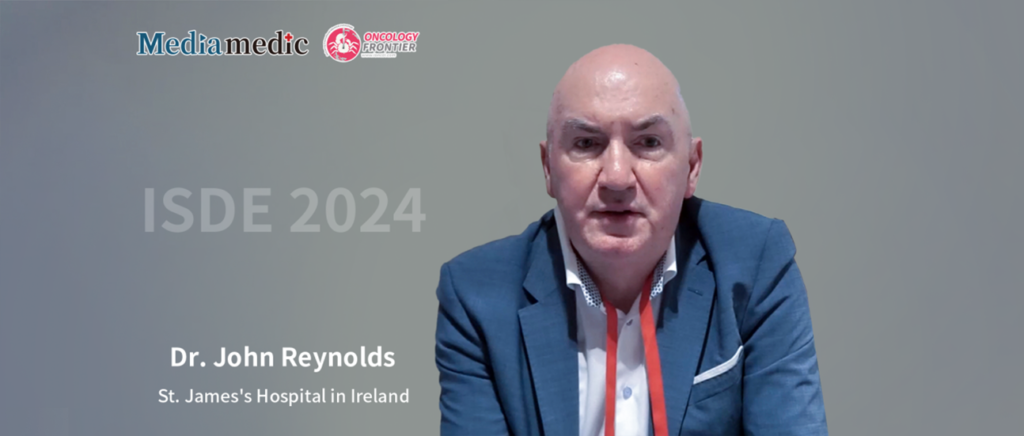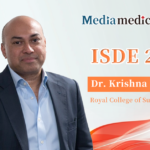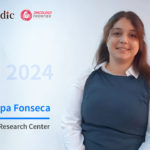
Editor's Note: From September 22nd to 24th, 2024, the 20th International Esophageal Cancer Conference (ISDE) took place in Edinburgh, Scotland. The Neo-AEGIS study, which compared the efficacy of perioperative chemotherapy with the CROSS regimen (preoperative chemotherapy combined with radiotherapy) in the treatment of esophageal cancer, captured global attention. As the corresponding author of the study, Dr. John Reynolds from St. James's Hospital in Ireland provided an in-depth interpretation of the research findings and discussed their profound impact on future strategies for esophageal cancer treatment.Oncology Frontier: Based on the key findings of the Neo-AEGIS study, how do you think these results will impact future treatment strategies and clinical practice for esophageal cancer?
Dr. John Reynolds: The key findings of the Neo-AEGIS study indicate that perioperative chemotherapy and the standard CROSS regimen (preoperative chemoradiotherapy) show no significant difference in efficacy for treating esophageal cancer. In other words, radiation therapy may not be essential for some patients in routine treatment. In this study, we maintained strict control over radiation quality and the assessment criteria for surgical complications. The results showed that preoperative chemoradiation did not lead to increased postoperative mortality or complication rates.
Additionally, although the perioperative chemotherapy group showed poorer pathological response, this did not impact overall survival (OS) or disease-free survival (DFS). This suggests that even if patients exhibit a weak tumor response before surgery, their long-term prognosis is not compromised. These findings advance our understanding of the previous CROSS and MAGIC trials, which addressed different issues at different points in time.
However, the latest data from the ESOPEC study indicates that the CROSS regimen shows superior efficacy compared to the FLOT regimen, prompting a reevaluation of treatment strategy choices. While we still need complete data to confirm these conclusions, it is foreseeable that many clinicians may have already started adjusting their practices to better implement trimodality therapy (preoperative chemoradiotherapy followed by surgery).
In the coming years, as more new studies are published, we anticipate further evolution in treatment strategies, which may significantly impact current therapeutic approaches. Specifically, if we can integrate the data from the Neo-AEGIS and ESOPEC studies, we will gain deeper insights into the relative advantages of different chemotherapy regimens, such as MAGIC and FLOT, compared to the CROSS regimen.
Oncology Frontier: What were the major challenges you encountered during the Neo-AEGIS study, and how did these challenges affect the implementation and results of the research? What strategies did you and your team employ to address these challenges?
Dr. John Reynolds: During the Neo-AEGIS study, we faced two main challenges. First, when we designed the trial in 2013, we compared perioperative chemotherapy (the modified MAGIC regimen) with the newly released high-impact CROSS regimen. However, we could not foresee the outcome of the FLOT4 trial, which was published in 2019 but presented in 2018. This trial demonstrated a significant benefit for FLOT compared to MAGIC, forcing us to quickly adjust our design from a superiority approach to a non-inferiority design. This was a major challenge.
Additionally, it raised questions about the necessity of radiation therapy, which we found was not essential, and it did not lead to increased surgical risks. This revelation was surprising and required substantial statistical analysis.
The second challenge was the pandemic, which was beyond our control. Recruitment for the trial was already struggling post-FLOT4, but when the pandemic hit, it completely halted recruitment. Given that the survival outcomes from the first and second futility analyses were initially identical for both perioperative chemotherapy and trimodal therapy, we concluded that it was prudent to terminate the trial, as it was unlikely to complete or reveal any significant differences.
Through these challenges, our team learned valuable strategies, including the importance of flexible trial design and timely evaluation of feasibility, which will benefit future research endeavors.
Oncology Frontier: Did the results of the Neo-AEGIS study reveal any new directions or unresolved issues for further research? What are your plans for future research to further explore these findings?
Dr. John Reynolds: I believe that every trial generates numerous questions. While I can offer some answers, many questions remain unanswered. Currently, no trial has specifically focused on early-stage cancers or biologically distinct cancer types. This means we can only provide a rough interpretation of studies like Neo-AEGIS and ESOPEC concerning the diverse patient groups we encounter in our weekly multidisciplinary discussions. Factors such as patient age and comorbidities significantly influence treatment choices—FLOT, for instance, can be particularly challenging for elderly patients, as trials often include only fit individuals.
There is still much we do not know, and trials must be evaluated in the context of specific cohorts. Otherwise, we struggle to interpret results from studies that do not predominantly include these patient populations.
Additionally, we must prioritize studying biomarkers as thoroughly as possible. While there is an optimistic belief that we will eventually be able to implement personalized treatment plans for patients, I remain cautious and want to see concrete results. Esophageal cancer is highly heterogeneous and notoriously difficult to treat, so we may be waiting a long time for significant breakthroughs in the neoadjuvant setting.
However, we do have emerging techniques, such as circulating tumor DNA analysis, microsatellite instability assessments, and PD-L1 testing. These methods should be incorporated into routine practice. We need to learn from everyday patterns of response and conduct novel clinical trials that will hopefully improve the prognosis for this challenging and hard-to-treat cancer.


